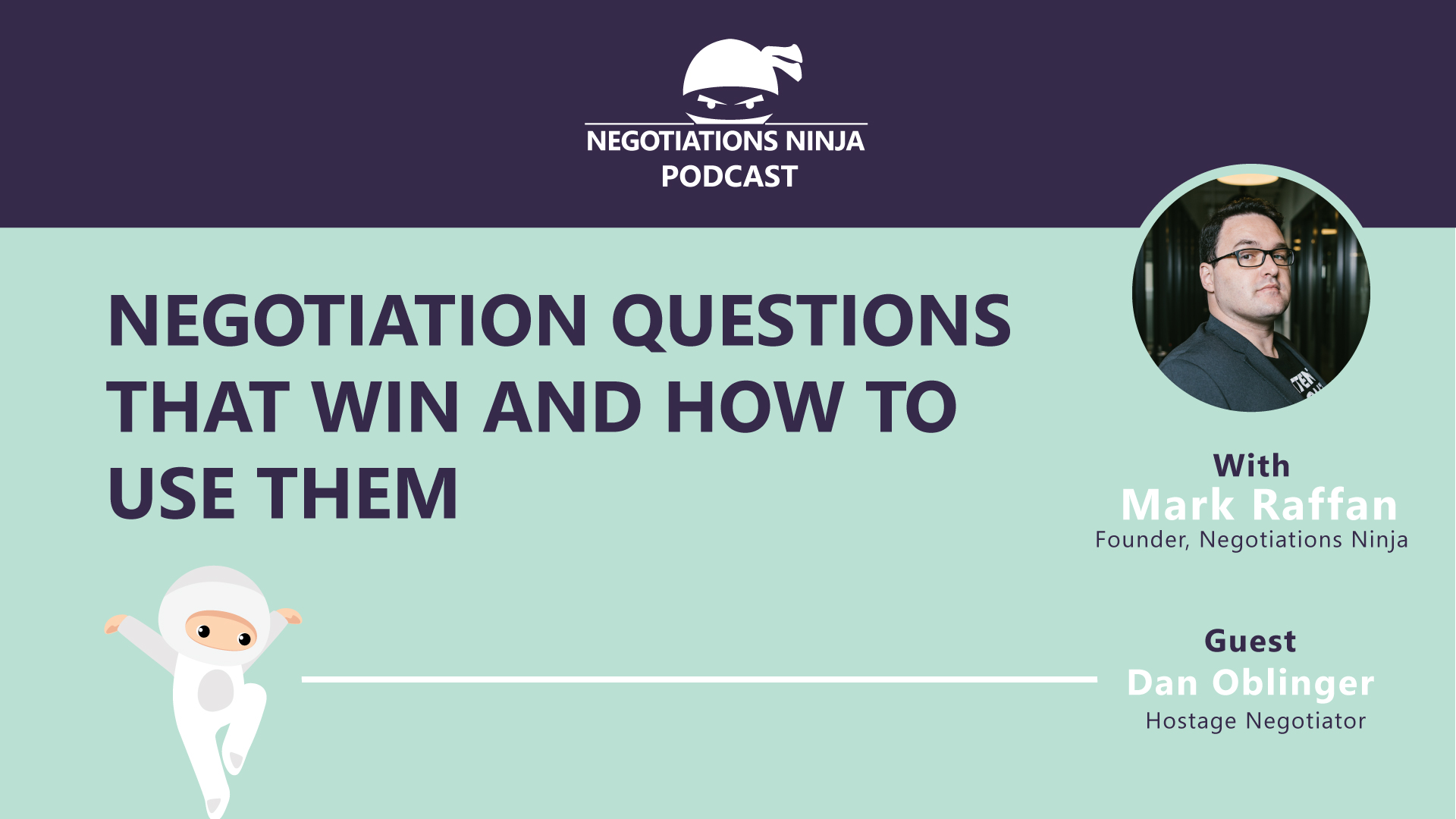There are few people I know who are as competent and smart about how the negotiation questions we use impact the way the conversation goes than Dan Oblinger. Dan’s experience as a hostage negotiator coupled with his drive to understand the impact of deep listening is at the root of this superpower. He’s a fount of nuanced knowledge and he shares it so generously during this conversation.
We talk about what he calls “Garbage questions” and why they are so bad, why we need to ask questions that deserve to be answered, and how we can KNOW we are utilizing the best questions possible. There is so much information in this episode you should listen to it twice — and take notes both times! Enjoy!
Outline of This Episode
- [2:05] Dan Oblinger’s insights into the role of negotiators and the power of negotiation
- [4:22] Most of the questions you ask are based on your preferred approach (and it’s horrible)
- [5:59] How can we ask questions that deserve to be answered?
- [13:01] Why questions are super risky but the simplest path to deep emotional responses
- [15:07] Are there ways to over-empathize as you ask questions
- [20:13] How to keep emotions in check when conversations begin to escalate
- [26:55] Why you need to treat the other person’s story with respect
- [31:06] Curiosity is at the heart of good questions — and it requires humility
Garbage questions should never be used as negotiation questions
Dan often refers to “garbage questions” and they are exactly what they sound like — low-value questions that typically get garbage responses in return. Dan’s not being mean by using this term, he’s just pointing out that most of us don’t give nearly enough thought to the types of questions we ask and whether or not those questions are beneficial to the conversations we’re having.
As an example of the types of questions you should avoid, Dan provides this:
Do you start your questions with “Do you?” — “Can you? — or “Will you?” If so, you’ve developed a very unfortunate and ineffective manner of giving direction or asking for input. First of all, those questions are only asking for a “Yes” or “No” answer. How much does that benefit the interaction? Besides, those types of questions are laden with authority, supplying the answer with the question in a way that is not conducive to revealing and helpful communication. Keep reading, Dan’s going to tell you how you can change that habit in a very simple way.
The best questions to ask in any negotiation
The way you ask for information determines the way the person answering will respond. It’s nothing mysterious, it’s just the way language works. So take a look at the first word of every question you ask. If your questions typically begin with “How” or “What” then you are on the right track. Questions beginning with those words tend to be questions about process, principles, and storytelling — just the kind of thing you want to draw out of people in negotiations and everyday conversations.
When you use these specific questioning approaches you get much more than information. The person will naturally share emotions, motivations, personal perspective, their attitude — and the best part is that they will do so using their own language. That is critically important because the words they choose to use reveals lots about them.
“WHY” questions are risky, use them carefully
Questions that begin with the word “Why” are very unique. They can be high reward questions, no doubt. But they are also very risky. Why? Because “Why” questions can be viewed as questioning motives, pointing out failures, and the like. They feel accusatory. Whether or not they are interpreted that way depends on how you ask them (tone) and the state of the person who’s being asked the question. Dan says that “Why” questions should be reserved for times when you know that you’ve built enough trust to bear the weight of the question. You want to be able to land a “Why” question without burning things to the ground.
The good news is that most times we want to ask “Why,” we have other options that will accomplish the same thing. “How” and “What” questions can be phrased very effectively for this purpose. For example, instead of asking, “Why did you do that?” you could ask, “What led to you choosing that course of action?” Do you see the difference? If you’re going to become a pro at negotiation questions, you have to see the difference and understand it on a deep level.
Can empathy be overdone?
The best negotiation questions lead to the discovery of information that proves vital to a good outcome. Much of the time, those good outcomes flow out of the negotiator’s ability to be empathetic with their counterpart. The more the person feels understood on a deep level, the more trust they feel toward the negotiator.
But is it possible that empathy can be overdone? Dan says that the only way empathy can be too much is if it’s not true empathy. People need to believe for themselves that you care. You show them that you do by listening deeply. When you are trying to manufacture feelings so they will think you are empathetic, it’s not true empathy. It’s more about you, not about them. Proper empathy is about truly caring for what the other person is feeling and experiencing. Dan recommends that you work with what the other person is willing to tell you in the moment, listen deeply, and hold out hope that they will trust you with more information later as a result.
Connect with Dan Oblinger
- Dan’s website: https://masterlistener.com/
- Dan Oblinger on LInkedIn
Connect With Mark
- Follow Negotiations Ninja on Twitter: @NegotiationPod
- Connect with Mark on LinkedIn
- Follow Negotiations Ninja on LinkedIn
- Connect on Instagram: @NegotiationPod




